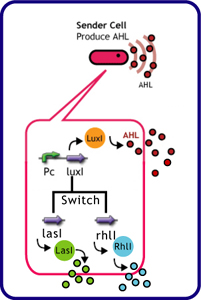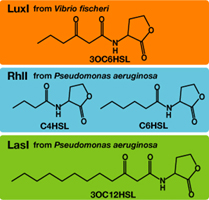Team:Chiba/Project/Experiments:Crosstalk
From 2008.igem.org
| Home | The Team | The Project | Parts Submitted to the Registry | Reference | Notebook | Acknowledgements |
|---|
Crosstalk
Design
Each species has their own LuxI-type proteins,which synthesize their specific autoinducers,AHLs.AHLs produced by different LuxI-type proteins differ only in the length of the acyl-chain moiety and substitution at position C-3.LuxR,which is original for Vibrio fischeri,is activated by its cognate autoinducer,3OC6HSL.However,LuxR is also activated by non-endogenous molecules,C4HSL,C6HSL,and 3OC12HSL.Activation by non-endogenous molecules requires a higher signal concentration(2).This results in slower activation of receivers,when AHL concentration is increasing.
異なる生物はそれぞれに異なるLuxIタイプのタンパク質を持ち、アシル鎖の長さ、あるいはC-3位の置換基が異なる種類のAHLを合成する。それぞれの生物種のLuxIタイプのタンパク質、それが合成する分子名は以下の表のようである。 (Fig.4).AHLを受け取り応答するLuxRタンパク質はVibrio fischeri由来であり、3OC6HSLに応答する。しかし、他種生物由来のAHLにも応答することが知られており、このとき、より高い濃度のAHLが必要となる(1),(2).AHLがゆっくり溜まっていく時、LuxRは3OC6HSLに対して最も早く応答し、他のAHLに対してはそれよりも遅く応答する。 (冨永)
 "
"


